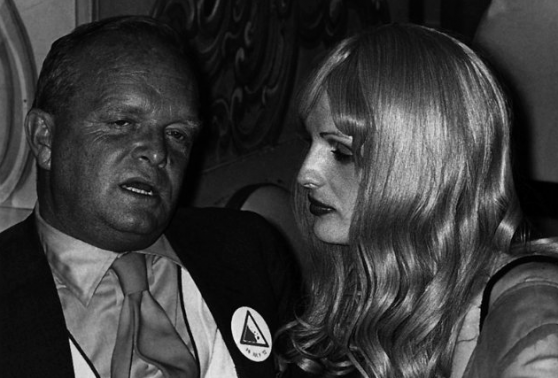31/31: Beautiful Darling

Photo: JJay Productions
Beautiful Darling has a sweet nostalgic sadness to it, like its subject, the former James Slattery who became a Warhol-Factory “Superstar.”
At first, it seems like it might be one of those sweet but lumpy home-sewn love letters to an icon from a tertiary figure, a sort of unscripted My Week With Marilyn, and while other interviewees talk about Jeremiah Newton with a mixture of confusion and carelessness — Newton would call himself a close friend of Candy’s; others see him as more of an acolyte; either way, he ended up with all her belongings, and had her ashes buried with his mother’s under a big shiny headstone — at least Newton stepped up to protect Candy’s legacy. (Candy’s mother remarried after Candy’s and her father’s deaths, to a bigot she never even told she had a (former) son, much less that “Jimmy” was a transwoman. What diaries and scarves Newton didn’t offer to take with him, Candy’s mother burned in a barrel. Hideous.)
Director James Rasin assembles quite a wonderful collage from Newton’s stash of Candyiana, his audio diaries and photo-booth strips; archival materials from the Andy Warhol collection in Pittsburgh; and interviews with key players from both Factories, the ’60s movie “studio” and the ’70s disco/portrait/Interview time, which like many of Warhol’s Superstars Candy tried and failed to straddle in the early ’70s before dying almost overnight of lymphoma at age 29. Beautiful Darling has a slapped-up vibe, but it fits; it has a family feeling, like Newton — once a shaggy beauty in the Keith Richards mold, now old and gouty like all Warhol survivors — does for Candy, and impromptu “art” that sucked on purpose and thereby questioned the nature of art was Warhol’s whole thing. Or that’s what he let people think.
The only letdown, for me, is that the film doesn’t press harder on Warhol’s other “whole thing,” to wit: he used and celebrated the people on the fringes until he himself graduated from the fringes to the center of things, which is of course what he always wanted but couldn’t let himself hope for, and then he didn’t want to know the unluckies anymore. My sense is that he had his conflicts about that process but was so passive-aggressive that he could never confront it, and if I remember Bob Colacello’s account of Candy’s passing in Holy Terror correctly, Warhol did step up to cover some of her debt while having severe mortality neuroses of his own after getting shot, but it’s still shitty no matter what the rationalizations. BD touches on it, gently; a few talking-heads mention Warhol’s tendency to use people and then move away from them, whistling. But Rasin may not have wanted to poke that hive too hard for fear of closing off access to people and works.
His access is great. Everyone you’d want to hear from who’s still living — Mead, Malanga, Morrissey, Colacello, Vincent Fremont, Holly Woodlawn serving Upper-West bubbe realness — is in it; there’s old footage of Candy rehearsing for the Tennessee Williams play that was supposed to launch her into a real career; Chloe Sevigny does a wonderful job reading from Candy’s diaries. (“Patton Oswalt as Andy Warhol and Truman Capote” is one of the most fantastic credits I’ve ever seen, especially since he’s voicing them both in a conversation with each other, and he nails it on both counts. Capote in particular is extremely difficult to do without going overboard. I wish there were an award for that — VO Degree Of Difficulty Prize, something. Well done, sir.) Also fantastic: everyone’s favorite L&O arraignment judge, Fran Lebowitz, who is acidic on the subject of growing up gay or trans “any time before…five minutes ago.” “Female impersonation” wasn’t legal in the ’60s in New York City (Holly is ruefully informative on some of the hacks they had to use back then), and by being herself, Candy was living dangerously. “If you got beat up,” Lebowitz grunts, “no one would feel sorry for you.”
It’s a lovely document, overall; I recommend it. Glad I went out on a high note with my 31st film, and speaking of lovely documents, my congratulations and apologies to John “Couch Baron” Ramos for surviving this stupid stunt, and please to marinate in his trenchant analyses of the 2014 film slate at Pull Up A Chair.
And now, I’ve heard there are stories in these things called “books,” and I believe I’ll go investigate them.
Tags: 31 Days 31 Films Andy Warhol Beautiful Darling Bob Colacello Candy Darling Chloe Sevigny Couch Baron documentaries Fran Lebowitz Gerard Malanga Holly Woodlawn James Rasin Jeremiah Newton movies Patton Oswalt Paul Morrissey Taylor Mead Tennessee Williams Truman Capote Vincent Fremont




